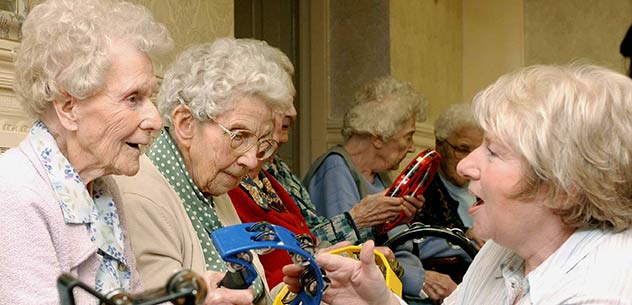 St Edmund’s Roundhay has been selected to receive intensive support to help Roundhay becoming a dementia friendly community.
St Edmund’s Roundhay has been selected to receive intensive support to help Roundhay becoming a dementia friendly community.
The Revd Nigel Wright says, “It’s one of two awards in North Leeds (the other went to the Harehills mosque) from Leeds Older People’s Forum. The aim of the award is to promote dementia friendly communities, and we’ve been chosen because of our existing work as a dementia friendly church and the dementia friendly café we run at the local community centre.
"The café, which is based around food and music, is really valued by the people who come. It helps carers feel less isolated as they can talk to each other and realise they’re not alone
 "And the power of music, especially singing, to unlock memories and kickstart the grey matter is an increasingly key feature of dementia care. It seems to reach parts of the damaged brain in ways other forms of communication cannot.
"And the power of music, especially singing, to unlock memories and kickstart the grey matter is an increasingly key feature of dementia care. It seems to reach parts of the damaged brain in ways other forms of communication cannot.
"However, we’re currently short of volunteers, so if you could help, please contact Bridget Hawkins: bridget_hawkins_bfc@hotmail.com 07518045133.
“Because of the award, we will receive intensive support for one year from Maria Florez, Leeds Older People’s Forum’s Dementia Friendly Community Officer. She and our Associate Priest, the Revd Bridget Hawkins, will work with individuals, community groups and organisations in Roundhay, to effect change to benefit those living with dementia, and those who care for them".
What is a Dementia Friendly Community?
The Alzheimer’s Society describes a dementia-friendly community as: “A city, town or village, where people with dementia are understood, respected and supported, and confident they can contribute to community life. In a dementia-friendly community people will be aware of and understand dementia, and people with dementia will feel included and involved, and have choice and control over their day to day lives.”
Dementia – the social care challenge of the 21st century.
Numbers affected by dementia in the UK are set to soar because of an expanding older population. (A figure of over 1m is predicted by 2021). So, while there are no long-term cures, making accessible ways of alleviating symptoms is crucial .